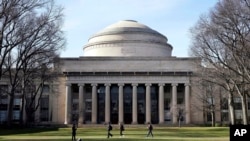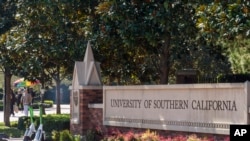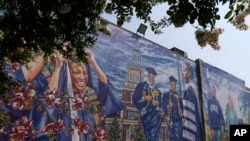Student Union
Grad Student Finds Error in Earlier Study

A Ph.D. student found a fundamental flaw in research published in 2014, and upon which she was building her research, which led to a retraction by the original author.
Susanne Stoll, at the Department of Experimental Psychology at University College London, said she thought she had made a mistake when trying to replicate the results of previous work in brain research.
“When I first stumbled upon the error, I had no clue what I was dealing with. I thought I had accidentally messed up my experiment because I obtained similar results in fairly distinct experimental conditions,” Stoll said in emails with VOA Student Union. “There was no extraordinary feeling I experienced. Errors are everyday business in science after all.”
Stoll tried to duplicate the results and checked the programming codes to determine where she had erred.
“The idea here is that if the analysis pipeline works the way it should, an analysis on random data should not produce the type of result I observed,” she said of research written about in a paper by Benjamin de Haas and colleagues while at the Institute of Cognitive Neuroscience at University College London in 2014.
“However, when I ran the analysis on random data, I obtained similar results as with the original data,” Stoll said.
After consulting colleagues, they determined she had revealed an error in the original research. They encouraged her to explore and correct it. When she reached out to de Haas, he was eager to help Stoll correct what they determined was an oversight.
He “was as keen as everyone else to figure things out despite knowing that he might need to retract his paper,” Stoll said. The process to reexamine one’s work is tedious, she said, but necessary to correct the error, which other papers reprinted.
'We apologize'
“We apologize to the scientific community for any inconvenience caused...Finally, we would like to thank our colleague Susanne Stoll, who first pointed out the problem to us and plans to publish in due course a more general exposition on the difficulties of this approach,” they wrote.
Mistakes are difficult for many professionals to admit. Retractions in science and medicine are not looked upon favorably, but they are necessary to clear the record about the process, accuracy and validity of medical and scientific research.
And they occur more often than most people realize.
Retraction Watch first published Stoll’s story. The staff has identified dozens of retractions of published results regarding the worldwide outbreak of the coronavirus responsible for the COVID-19 disease. The ailment has caused more than 1.8 million deaths worldwide, including more than 357,000 in the United States, according to the Johns Hopkins University.
Some of the journals that have seen papers retracted include The New England Journal of Medicine, The Lancet, Annals of Internal Medicine, Journal of Public Health, Asian Journal of Psychiatry, Korean Journal of Anesthesiology and Chinese Journal of Epidemiology.
Retraction Watch is a function of the Center for Scientific Integrity, whose mission is “to promote transparency and integrity in science and scientific publishing, and to disseminate best practices and increase efficiency in science.”
Who funded the research?
In addition to protecting the integrity of science, Retraction Watch sheds light on the funding process.
“Most retractions live in obscurity in Medline and other databases. That means those who funded the retracted research — often taxpayers — aren’t particularly likely to find out about them,” it says in answers in its frequently asked questions section. “Nor are investors always likely to hear about retractions on basic science papers whose findings may have formed the basis for companies into which they pour dollars.”
Sciencemag.org quoted Retraction Watch in a 2018 article that said retractions had increased tenfold between 2000 and 2014, likely because of increased editorial oversight. Still, 60% of retractions are because of fraud, Sciencemag.org said.
Fraud occurs when a researcher asserts information that has not been scientifically proven or vetted. One famous case, according to the science journal Nature, is that of Yoshihiro Sato, who for nearly 20 years "fabricated data and forged authorships — prompting retractions of more than 60 studies," it reported its website in 2019.
“There is certainly a stigma attached to retractions, which are often exclusively associated with fraud,” Stoll said. “However, both an oversight and fraud can lead to retraction. It is important to distinguish these cases, and I hope that our case encourages other researchers to correct their honest mistakes and that this moves science forward.”
See all News Updates of the Day
Malaysian official: Schools can’t turn away from global tensions

Zambry Abdul Kadir, Malaysia’s higher education minister, said protests spreading across universities in the United States show that schools can’t ignore political tensions.
Helen Packer, reporting in Times Higher Education, said the minister reminded educators that universities are key in the development of leaders, individuals and societies. (April 2024)
Social media breaks are difficult, but necessary

Between online classes, maintaining social connections and working on projects, college students can have a hard time disengaging from the demands of technology.
In Florida International University’s PantherNOW, Ariana Rodriguez offers strategies for taking a break from social media. (April 2024)
- By Melos Ambaye
Many master's degrees aren't worth the investment, research shows
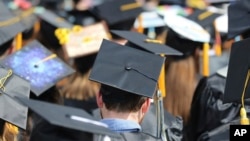
Nearly half of master's degrees have a negative financial return, according to new research by the Foundation for Research on Equal Opportunity, an economic research organization.
The study indicates that many graduate degree programs do not increase lifetime earnings enough to be worth it.
While 23% of bachelor’s degree programs yield a negative financial return on investment, 43% of two-year degrees and master’s degrees fail to deliver a return, according to the study by Preston Cooper, a senior fellow at FREOPP.
Cooper assessed the return on investment for 53,000 degree and certificate programs to determine whether a student’s lifetime earnings outweigh program costs and the risk of not completing their degree.
His findings show that a student’s field of study was the overriding indicator of return on investment at the undergraduate and graduate level.
Engineering, computer science and nursing bachelor’s degrees have high financial returns on investment, while programs in education, fine arts, psychology and English usually have low returns.
Graduate degrees in medicine and law tend to have strong payoffs. But a large share of master’s programs, including the MBA, frequently have low payoffs, according to Cooper.
Although workers with master’s degrees earn 16% more than those with only bachelor’s degrees, Cooper says the figure fails to account for students who had “higher preexisting earnings potential.”
“MBA students typically have high preexisting earnings potential, having often chosen high-ROI undergraduate majors such as finance and economics,” Cooper writes. “So the MBA adds little value on top of that.”
The study indicates that high starting salaries are predictors of high returns on investment. Degrees with starting salaries of $57,000 a year or more deliver the best lifetime returns.
But the return on investment of a degree can vary depending on the educational institution.
“Students interested in fields with low average pay can still find some schools that do well transforming those fields of study into high-paying careers,” Cooper writes.
The quality of an institution also matters, said William Tierney, professor emeritus of higher education at the University of Southern California.
“An MBA from Harvard is a likely ticket to a good job,” Tierney told VOA. “An MBA from the University of Phoenix, less so.”
But students pursue graduate programs for more than just financial reasons.
“Some degrees open up careers in fields that students may enjoy, such as in the performing arts,” Robert Kelchen, head of educational leadership at the University of Tennessee, Knoxville, told VOA.
“Others can help gain access to social networks or simply help students learn about a topic that is of interest,” Kelchen added.
Cooper told VOA that it might make sense for students in degree programs with low returns on investment to switch majors if they can still graduate on time.
He found the worst outcome for a student’s return on investment is dropping out of college “because they must pay for one or more years’ tuition and spend time out of the labor force.”
Lawmakers who fund higher education have a responsibility in ensuring “higher education delivers on its promise of economic mobility,” Cooper said.
Nearly a third of federal funding, including Pell grants and student loans, pays for higher education programs that fail to provide students with a return on investment, according to the study.
Cooper’s view is that “some schools should shut down low-ROI programs and reallocate institutional resources to programs with a better return.”
“There's definitely this narrative out there that higher education is always worth it, and you should always try to get that extra degree because it will increase your earnings,” he told VOA. “That's reinforced by colleges who make lofty promises regarding their graduate degree programs' outcomes, which all too often fall short.”
Harvard students end protest as school agrees to discuss Gaza conflict
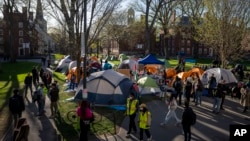
Protesters against the war between Israel and Hamas were voluntarily taking down their tents in Harvard Yard on Tuesday after university officials agreed to discuss their questions about the endowment, bringing a peaceful end to the kinds of demonstrations that were broken up by police on other campuses.
The student protest group Harvard Out of Occupied Palestine said in a statement that the encampment "outlasted its utility with respect to our demands." Meanwhile, Harvard University interim President Alan Garber agreed to pursue a meeting between protesters and university officials regarding the students' questions.
Students at many college campuses this spring set up similar encampments, calling for their schools to cut ties with Israel and businesses that support it.
The Israel-Hamas war began when Hamas and other militants stormed into southern Israel on October 7, killing some 1,200 people and taking 250 hostages. Palestinian militants still hold about 100 captives, and Israel's military has killed more than 35,000 people in Gaza, according to Gaza's Health Ministry, which doesn't distinguish between civilians and combatants.
Harvard said its president and the dean of the Faculty of Arts and Sciences, Hopi Hoekstra, will meet with the protesters to discuss the conflict in the Middle East.
The protesters said they worked out an agreement to meet with university officials, including the Harvard Management Company, which oversees the world's largest academic endowment, valued at about $50 billion.
The protesters' statement said the students will set an agenda that includes discussions on disclosure, divestment, reinvestment and the creation of a Center for Palestine Studies. The students also said that Harvard has offered to retract suspensions of more than 20 students and student workers and back down on disciplinary measures faced by 60 more.
"Since its establishment three weeks ago, the encampment has both broadened and deepened Palestine solidarity organizing on campus," a spokesperson for the protesters said. "It has moved the needle on disclosure and divestment at Harvard."
Chinese students report interrogations, deportations at US airports
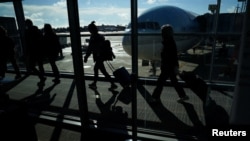
Academics from China are reporting increased scrutiny at U.S. airports, with valid visa holders being interrogated and turned away by Customs and Border Protection Agents.
Phones and laptops have been searched, and researchers have undergone extensive questioning about their work. One graduate student at Yale, who was midway through her PhD, was turned back at Dulles airport and banned from entering the U.S. for five years, according to The Guardian.





